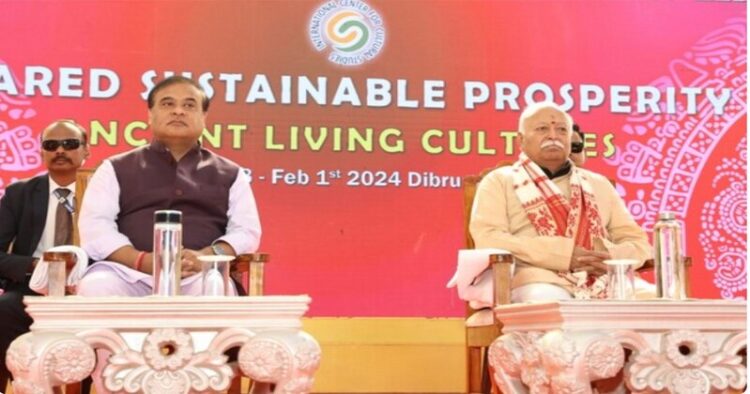Dibrugarh: In a thought-provoking address at the 8th Triennial International Conference in Dibrugarh, Assam, Rashtriya Swayamsevak Sangh (RSS) Sarsanghchalak Dr Mohan Bhagwat emphasised the crucial need to preserve indigenous belief systems. Delving into humanity’s challenges, he urged a collective effort to overcome religious egos and narrow-mindedness. Dr Bhagwat highlighted the urgency of safeguarding ancient traditions in the contemporary world. Addressing the audience, Dr Mohan Bhagwat focused on the urgent need to preserve indigenous belief systems, emphasising the erosion of cultural heritage and the profound knowledge embedded within them.
In his address, Dr Mohan Bhagwat reflected on the state of the world, expressing concern over the persisting problems that have haunted humanity for the last 2000 years. Despite material progress, the world grapples with issues such as wars, lack of peace, and inner conflicts. Bhagwat noted the paradox of advancements in education coexisting with continued violence, highlighting the troubling phenomenon of children going to school armed and engaging in violence against their classmates.
Dr Bhagwat delved into the root causes of these challenges, pointing towards ego, religious egos, and community conflicts. He remarked on the divisive nature of human thinking, where individuals often find themselves caught in the dichotomy of “us and them, ours and theirs.” He emphasised the need to transcend these groupings and unite for the greater good of humanity, cautioning against the tendency for those seeking change to become another exclusive group inadvertently.
The RSS Sarsanghchalak drew inspiration from historical figures such as Birsa Munda and Mahatma Gandhi, who championed the preservation of indigenous faith and culture. Dr Bhagwat commended the efforts of the Indigenous, Tribal Faith and Culture Department in Assam, acknowledging their initiatives to minimise external influences and support Indigenous communities.
Addressing communities’ challenges, Dr Bhagwat discussed various philosophical and ideological frameworks that emerged over the years. From individualism, which neglected societal importance, to communism, which prioritised society to the detriment of individual bliss, he highlighted how these theories often focused solely on material prosperity. Dr Bhagwat emphasised the failure of these ideologies to comprehend the underlying element of oneness connecting all dimensions of human existence.
Dr Bhagwat underscored the significance of ancient wisdom, particularly the concept of “save sukhinah santu” – let all be happy. He stressed the importance of spiritual oneness, which the Bharatiyas call dharma. According to him, following one’s dharma brings bliss at every stage of life. The ancient cultures recognised the diversity inherent in humanity, viewing it positively as an expression of oneness manifested in different forms.
Highlighting the interrelated nature of individuals, communities, society, and nature, Dr Bhagwat proposed a cultural approach to achieving peace and prosperity. He noted how a UN resolution in 1951 initially advocated for abandoning ancient philosophies, only to acknowledge in 2013 that integrating culture into development policies was essential for global progress.
Dr Bhagwat urged practical actions over mere discussions, emphasising the interconnectedness of humanity with nature. He shared a folk story to illustrate that, with the right wisdom, people can come together to create a new world free from conflicts and environmental disasters. Sarsanghchalak Dr Bhagwat applauded the International Conference for its commitment to revitalising ancient traditions and fostering global collaboration, urging participants to rededicate themselves to preserving indigenous faith and culture.
In a world grappling with contemporary challenges, the words of Dr Mohan Bhagwat serve as a call to action, urging society to draw upon ancient wisdom to navigate the complexities of the modern era. The commitment to preserving traditions and fostering collaboration becomes not just a responsibility of the minority but a shared duty of the majority community in the ongoing journey of humanity.




















Comments